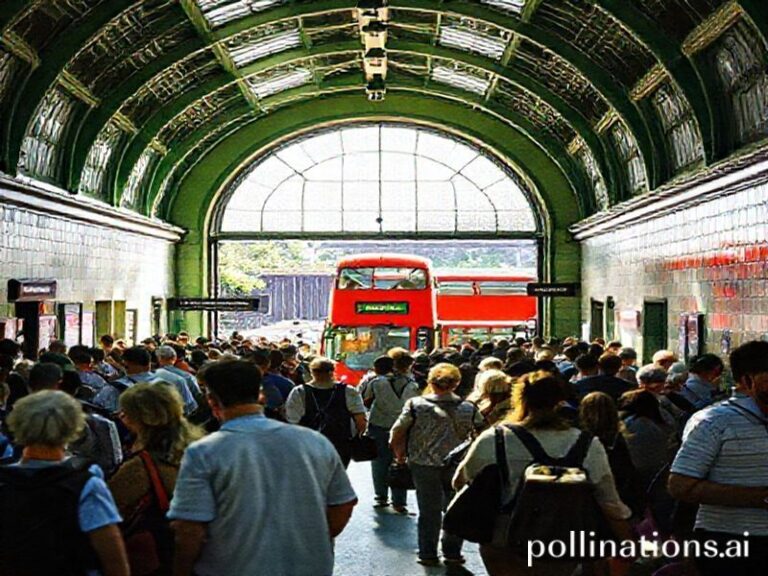London’s Latest Meltdown: A Global Masterclass in Polite Decline
London, Once Again, Shows the World How to Lose Gracefully
By Our Man in Terminal 5, nursing a £7.50 flat white and residual jet-lag
LONDON—This foggy island capital has always been a reliable barometer for global mood swings, and the latest needle twitch is characteristically British: equal parts polite panic and theatrical indifference. In the past fortnight alone, London’s news cycle has offered a masterclass in how to export existential dread while keeping a stiff upper lip. For foreign observers, it’s like watching a period drama where the empire politely apologises for collapsing on your shoes.
Take the Bank of England’s newest hobby: competitive interest-rate limbo. While the Federal Reserve and the European Central Bank perform painstaking choreography to avoid recession, the Old Lady of Threadneedle Street has adopted the more avant-garde approach of hiking until something breaks—preferably the housing market, consumer confidence, or, if we’re lucky, the queue at Pret. International investors, ever the connoisseurs of slow-motion car crashes, have responded by dumping sterling faster than a hedge-fund intern deletes WhatsApps. The pound now flutters against the dollar like a moth trapped in a karaoke bar: occasionally dramatic, mostly doomed.
Meanwhile, the city’s transport authority has discovered a revenue stream even more lucrative than fining tourists for breathing on the Tube: selling naming rights to stations. Rumour has it the next stop after Piccadilly Circus could be “Circle-K Piccadilly.” Corporate colonialism never died; it just got a contactless reader. Metropolitan mayors from Lagos to Lima are taking notes—because if London can monetise geography itself, surely there’s hope for the rest of us trying to plug budget holes left by, well, everything.
The environmental subplot is equally on-brand. Londoners, who once pioneered the coal-smog selfie, are now pioneering the low-emission humblebrag. Ultra-Low Emission Zone (ULEZ) cameras sprout like mushrooms after rain, photographing non-compliant vehicles with the same devotion paparazzi once reserved for Princess Diana. Global automakers—who spent the last decade lying about diesel emissions with the sincerity of a pick-up artist—are suddenly marketing “ULEZ-compliant nostalgia” in markets from Delhi to Denver. The message: pay us again, planet optional.
Over at Westminster, the governing party’s latest leadership contest resembles a reality show rejected for being too cynical even by Netflix standards. Candidates promise tax cuts the way teenagers promise to clean their rooms: loudly, briefly, and only when someone’s watching. Foreign diplomats, accustomed to Britain lecturing the world on institutional stability, are updating their risk assessments with a single footnote: “LOL.” The spectacle has proven oddly reassuring to nations whose own democracies have already imploded—proof that decline is democratic after all.
And then there’s migration. London’s mayor has floated the radical idea of actually letting people work while their asylum claims are processed, prompting apoplectic tabloid headlines about “jobs for foreigners”—as though the city’s £6 cappuccinos were presently being frothed by patriotic ghosts. Across the Channel, French officials chuckle into their wine; across the Atlantic, American governors wonder if they too can bus their unwanted populations to Martha’s Vineyard once the UK runs out of Rwanda vouchers. The global takeaway: rich countries remain world-class at turning human desperation into political sport.
Yet, amid the flaming rubble of post-imperial self-harm, London still manages to project soft power with the efficiency of a pickpocket on the Central Line. Its courts host kleptocrats laundering reputations; its universities sell enlightenment by the semester; its creative industries export dystopian futures to every Netflix queue. Even the city’s current brand of dysfunction is aspirational: if you too would like your national decline narrated in plummy accents and accompanied by artisanal gin, please form an orderly queue.
So, what does London’s latest news teach the planet? That decline is inevitable, but branding is eternal. That crisis, properly curated, can be monetised by borough. And that, in the end, the empire strikes back—mainly with service charges and sarcasm. The rest of us can only watch, take notes, and perhaps update our own disaster plans to include a witty voice-over.







